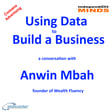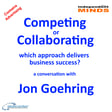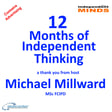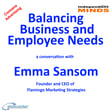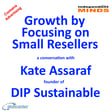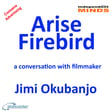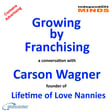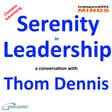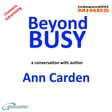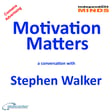
Grieving and Working – a conversation with Grief Educator Suzanne Jabour
Death is an accepted fact of life, but bereavement and grief is still not widely understood, and that creates problems for bereaved people and costs for their employers.
Suzanne Jabour is a grief educator, she is on a mission to change how we understand grief and how employers respond to and support employees who are grieving.
When her son died Suzanne realised that the only way she would be able to survive the grief, would be by getting curious. Suzanne knew that she needed to understand what was happening to her and working out for herself how to work her way through that grief.
In this episode of The Independent Minds Suzanne and host Michael Millward discuss the difficulties employers face when an employee faces a bereavement.
Everyone experiences grief differently, but one common affect is a drop in productivity.
Suzanne explains how employers can start the discussion about grief with their employees, so that employees know before they experience a bereavement that their employer understands their experience and that they will be supported.
You will leave this episode inspired to review your employee bereavement policy.
More information about Suzanne Jabour and Michael Millward is available at abeceder.
Audience Offers
The Independent Minds is made on Zencastr, because as the all-in-one podcasting platform, Zencastr really does make creating content so easy.
If you would like to try podcasting using Zencastr visit zencastr.com/pricing and use our offer code ABECEDER.
Travel
With discounted membership of the Ultimate Travel Club, you can travel anywhere else at trade prices on flights, hotels, trains, and many more travel related purchases.
Fit For Work We recommend The Annual Health Test from York Test; a 39-health marker Annual Health Test conducted by an experienced phlebotomist with hospital standard tests carried out in a UKAS-accredited and CQC-compliant laboratory.
A secure Personal Wellness Hub provides easy-to-understand results and lifestyle guidance
Visit York Test and use this discount code MIND25.
Visit Three for information about business and personal telecom solutions from Three, and the special offers available when you quote my referral code WPFNUQHU.
Being a Guest
We recommend the podcasting guest training programmes available from Work Place Learning Centre.
We use Matchmaker.fm to connect with potential guests If you are a podcaster looking for interesting guests or if you have something interesting to say Matchmaker.fm is where great guests and great hosts are matched and great podcasts are hatched. Use our offer code MILW10 for a discount on membership.
We appreciate every like, download, and subscriber.
Thank you for listening.



